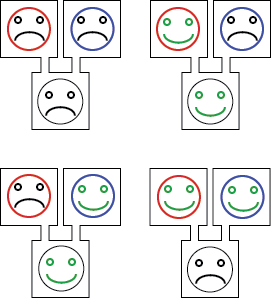Team:ETH Zurich/project/background/modelingsimple
From 2014.igem.org
(→Pattern Formation) |
(→Pattern Formation) |
||
| Line 9: | Line 9: | ||
In our project, we are using a particular logic gate, named XOR. Here is an example : imagine your bacterial colonies are either happy or unhappy. If they are happy, they send a signal to their children, inviting them to a party. If a colony is invited to one party (by either of its parents), it becomes happy. If it is not invited to any party, it is unhappy. If a colony is invited by both its parents, it becomes unhappy (because there is here a dilemma). | In our project, we are using a particular logic gate, named XOR. Here is an example : imagine your bacterial colonies are either happy or unhappy. If they are happy, they send a signal to their children, inviting them to a party. If a colony is invited to one party (by either of its parents), it becomes happy. If it is not invited to any party, it is unhappy. If a colony is invited by both its parents, it becomes unhappy (because there is here a dilemma). | ||
<br> | <br> | ||
| + | <br/> | ||
| + | <br/> | ||
[[File:ETHZurich LogicGate.png|300px|center|thumb|An XOR logic gate.]] | [[File:ETHZurich LogicGate.png|300px|center|thumb|An XOR logic gate.]] | ||
Revision as of 07:36, 2 October 2014
Pattern Formation
We want to form a pattern (a motif) on a grid of bacterial colonies. Our output signal is binary: a bacterial colony is either in an on-state or in an off-state. The on-state can be read out by the green fluorescence.
Each bacterial colony has two parents. Those parents emit a signal, if they are on. The bacterial colony can differentiate the two signals it gets from its parent. Depending on theignals received by a bacterial colony, it will switch on or off. This is the principle of a logic gate.
In our project, we are using a particular logic gate, named XOR. Here is an example : imagine your bacterial colonies are either happy or unhappy. If they are happy, they send a signal to their children, inviting them to a party. If a colony is invited to one party (by either of its parents), it becomes happy. If it is not invited to any party, it is unhappy. If a colony is invited by both its parents, it becomes unhappy (because there is here a dilemma).
 "
"
